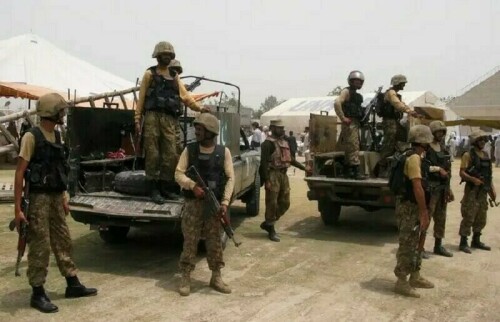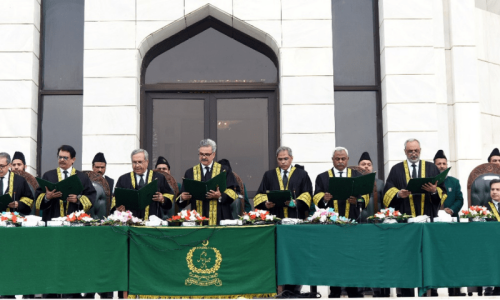
IT is a basic principle of representative democracy that citizens elect people who govern and serve the community and society at large. Inclusivity and the opportunity to control the agenda is what keeps voters’ faith and ensures their active participation in this ideal. Nonperforming parties or individuals can be voted out at the next election, thus giving a measure of control to every voter. Pakistan’s major cities — certainly all the provincial capitals barring one — are governed by these principles. The exception is Karachi.
The PPP has been running Karachi for the past eight years, and its lacklustre performance is glaring. The Mercer’s Quality of Living Survey ranks Karachi 202nd out of 230 cities, dropping 12 places since 2012. The Economist’s Intelligence Unit also puts it near the bottom; 134th out of 140 cities.
This is a regular feature of Pakistan’s largest city and commercial hub, a place that contributes half of the total revenue collected by the FBR and more than 20pc of the national output. You don’t need to rely on international rankings; the deplorable conditions of roads, mounds of uncollected waste, stagnant pools of un-drained rainwater and lack of development make it clear to any observer that Karachi is in steep and perceptible decline.
Sindh’s other cities share this same fate: malnutrition, child deaths, inadequate healthcare, derelict public schooling and crumbling law and order are just some of the issues that plague the province. But there is a key difference. Unlike Karachi, the people of interior Sindh chose those who run their cities.
In the last elections, whether for National Assembly, provincial or local governments, the PPP has been trounced in Karachi. It won a solitary National Assembly seat out of 20, and just five provincial seats out of 40. It was also beaten in the local body elections, in both the Karachi Metropolitan Corporation and the district polls. The national and provincial assemblies’ results are similar to the previous election, thus making it clear that PPP has only the most tenuous of toeholds in Karachi.
And yet, due to the existing governance model, it has been in charge of Karachi’s affairs. The Sindh Local Government Act of 2013 was meant to devolve administrative powers to local councils, but instead made them subservient to the provincial government. The mayor’s position is a much watered down post, having none of the powers given to the nazim by the Local Governance Ordinance of 2001. This is in contrast to KP’s local government system, which gives autonomy to locally elected government officials.
Provincial representatives hold the city hostage.
The Sindh Assembly ensured that Karachi would be administered through the province by retaining civic entities such as Karachi Water and Sewerage Board, Sindh Building Control Authority, Solid Waste Management Board and others. By doing so, it abrogated the responsibilities of the municipal bodies. For instance, the Sindh Solid Waste Management Board has taken over the responsibility of solid waste collection from the KMC and, instead of local government representatives, the provincial chief minister is in charge of the city’s sanitation. Karachi’s overflowing gutters and garbage dumps can show how well this policy has worked.
Local government systems work — not because they are politically expedient but simply because they have shown to produce the desired results of direct democracy. Large cities (eg New York City and Chicago) are managed through local administrative bodies and the mayor has broad executive powers. Even national capitals (eg London) have powerful mayoral offices that ensure citizen participation in the functioning of the metropolis.
Mumbai — sometimes compared with Karachi in terms of key characteristics like population size — has a municipal commissioner who is appointed by the Maharashtra state’s government, but it is unthinkable for the state government to do so if it has virtually no representation in Mumbai.
The simple fact is that Karachi’s fate is being decided by voters who don’t live in the city and do not face the failures of the provincial government on a daily basis. Since officials are not tied to votes or answerable to the city’s people, there is great disconnect, which has translated into gross mismanagement and general malaise.
In a functioning democracy, the only means of redress is the vote. Recently, the BJP lost the state elections in Delhi and Bihar due to performance issues, the first blocks for Narendra Modi’s electoral juggernaut of empowered local voters. Nullify this power and you have a sham democracy in which people elected from other places have power over people who have actually booted them out.
Since the PPP leadership and voting patterns of interior Sindh are unlikely to change, Karachi faces a conundrum that is fast leading to an existential crisis.
The writer works in academia.
Twitter: @Sibtain_N
Published in Dawn, August 18th, 2016










































